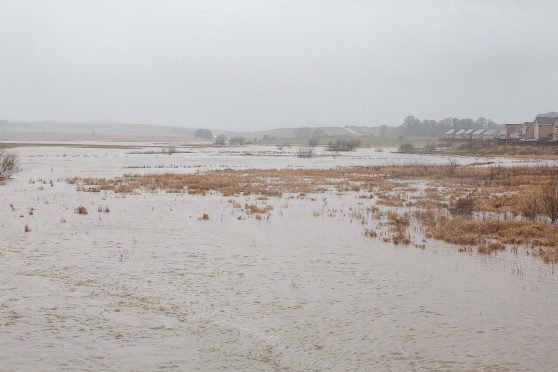North-east farmers have called on environment agency Sepa to work together with them to help prevent severe floods from happening again.
Flood-hit producers attending an NFU Scotland meeting in Thainstone, Inverurie, yesterday, blamed out-of-date regulations which prevent the proper management of rivers for the recent spate of flooding.
The producers called for a return to the regular management of rivers, as done by landowners and contractors in the past.
A heated debate erupted at the meeting, which was also attended by representatives from Sepa, Aberdeenshire Council and various politicians, over who was to blame for the floods and whose responsibility it was to deal with the clean-up.
NFU Scotland president Allan Bowie said river management regulations needed to be relaxed, while the union’s chairman for the north-east, Roddy Catto, said landowners and contractors needed to be allowed to deal with “pinch-points” in rivers.
“Gravel banks and sand banks have been neglected,” said Mr Catto.
“If these were removed the river would naturally pull gravel down and the tide would take it away, but that is not being allowed.”
Ballater councillor Katrina Farquhar pushed Sepa and Aberdeenshire Council for answers to questions over whose responsibility it was to clear away debris and reinstate fields.
She said government grant funding, although welcomed, was not enough.
“What will happen to the farmers who have lost fields and they have not got money to clear them? Whose responsibility is it to clear that field and who will pay for it?” she asked.
Sepa’s operations unit manager for the south Grampian area, David Ogilvie, said Sepa was not a grant awarding agency but it was there to provide advice and give approval to people to manage watercourses.
He urged landowners to contact the agency and put together proposals on how best to manage rivers, burns and ditches.
Farmers needing to replace man-made flood defence structures were permitted to do so without Sepa’s approval, provided a “like-for-like” structure was erected.
However, producers needed approval from Sepa before carrying out works involving machines in rivers, the creation of a structure bigger than the original one which was destroyed and for dredging anything other than small, straightened ditches, added Mr Ogilvie.
Aberdeenshire Council’s director of infrastructure services, Stephen Archer, told flood-hit producers to apply to their local authorities for their share of Scottish Government funding.
The funding, which was announced by First Minister Nicola Sturgeon earlier this year, gives any flooded household or business a grant of £1,500, while businesses whose ability to trade has been sever
At the close of the meeting, Mr Catto said NFU Scotland would set up working groups to help flood-hit farmers and to look into how landowners could work together to manage watercourses.
Mr Bowie said similar work had been successfully by groups of farmers in Coupar Angus.
More details are available from the union.
